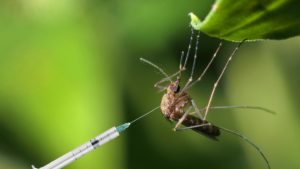Can you ever imagine a malaria free Africa? No way! Judging from the long, arduous, complex and expensive journey complicated by climate change, to find a permanent treatment, the disease might seem impossible to eradicate.

While existing interventions have significantly reduced the burden of malaria across Africa, mainly due to the scale-up of long-lasting insecticide treated bed nets (LLINs), indoor residual spraying (IRS), and artemisinin-based combination therapies (ACTs), the global community is concerned about the continuous threat malaria poses to the health, wellbeing and social economic development of the continent.
As at 2022, the global estimates of malaria cases were 249 million and malaria related deaths were 608,000 in 85 countries. The African Region alone accounted for 233 million (94 percent) of the malaria cases and 580,000 (95 percent) of its associated deaths, according to WHO records.
Now, experts believe that without additional complementary interventions, Africa Union’s target for malaria elimination by 2030, which is just six years away, will not be achieved.
Well, if you consider that the first ever transgenic mosquito strain has been developed in Africa, then there is hope for a malaria free Africa to happen. It carries genetic modifications in its genome that will enable scientists in the future to render mosquitoes incapable of transmitting malaria.
This has been hailed as a significant scientific breakthrough marking a pivotal milestone in the renewed international efforts to eliminate malaria in Africa. Researchers are hopeful that this gene drive technology could stop mosquitoes from spreading malaria, and rather equip them to fight the disease.
The transgenic mosquito strain was developed by the “Transmission Zero Programme” – A global malaria research programme working to develop innovative genetic tools to stop malaria transmission. It is a collaborative programme by scientists at the Imperial Collage London, UK and the Ifakara Health Institute (INI), Bagamoyo, Tanzania, the National Institute of Medical Research (NIMR), Tanzania and the SwissTPH, a leading institute in global health.
A Principal Research Scientist and Director of the “Transmission Zero Project” at the Ifakara Health Institute, Dr. Dickson Lwetoijera, introduced the programme to participants during the second in the series of Awareness Webinars for journalists and scientists to exchange knowledge and deliberate on genetic biocontrol technologies.
He explained that development of this innovative genetic tool, has been necessitated by several factors including reversal of progress made in tackling malaria, insecticide resistance, parasite drug resistance and parasite detection resistance. Others are urban malaria vectors and climate change.
He said their work has grounding in some global and regional regulatory frameworks such as the Cartagena Protocol on Biosafety, Guidance Framework for Testing Genetically Modified Mosquitoes produced under the auspices of the WHO, and African Union/NEPAD’s Gene Drives for Malaria Control and Elimination in Africa developed by the AU High Level Panel on Emerging Technologies.
However, a lot more remains to be done for Africa to tap the benefits of the innovative transgenic mosquito strain. For instance, there is urgent need to raise contextual and technical awareness as well as understanding of these innovative technologies and their processes.
Dr. Lwetoijera also highlighted the need for the development of collaborative frameworks to support the assessment of the dossiers submitted at the different stages of technology evaluation; the need to leverage on the existing ethics and governance guidelines on gene-editing for on-going trials; and the need to leverage on the existing technical platforms like the National Malaria Control Programmes (NMCP) to discuss the potential of genetic modification and gene drives for their contribution towards malaria elimination.
The Awareness Webinar, which took place about a fortnight ago, on Thursday, March 14, 2024, was organised by the Science Communication Forum (SCICOM), established by the African Genetic Biocontrol Consortium. SCICOM is serving as a platform for interaction among Journalists and Scientists to enhance opportunities for knowledge exchange and deliberation on issues related to new emerging technologies such genetic biocontrol and gene drives.
The first Awareness Webinar was held on Thursday, February 22, 2024, on the theme “The Importance of community engagement and education in genetic biocontrol technologies in Africa.”
The African Genetic Biocontrol Consortium formed in November 2020, is an agreement among member organisations committed to contribute and expand Africa’s self-determination through research, development, and use of genetic biocontrol approaches to control and eliminate malaria and other vector-borne diseases in Africa.
It’s coming into being is in line with the AU High Level Panel on Emerging Technologies recognition of the need for stakeholder engagement as key to ensuring that development of emerging technologies meet their expectations and have a great chance to be accepted and supported. This is outlined in its “Gene Drives for Malaria Control and Elimination in Africa” Report, which also recommends that countries should invest in the development and regulation of gene drive technology, whose greatest and most urgent application will be in malaria control and elimination.
So, the Consortium has a vision of building an informed local leadership to support the requirements for development and decision-making as well as on the utility of genetic biocontrol technologies for animal, public health, and conservation in Africa.
Hence, its first Strategic Priority has been to provide a regular avenue for in-depth discussion and debate of the needs and requirements for testing of genetic biocontrol technologies by experts from countries most likely to experience both the risks and the benefits.
By Ama Kudom-Agyemang
